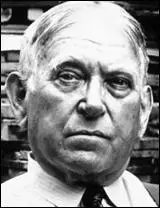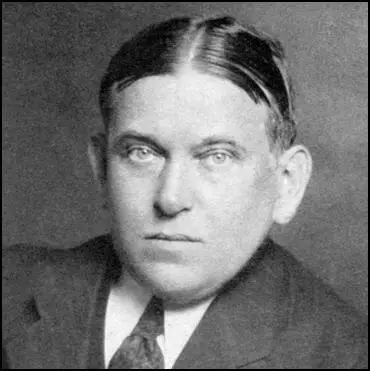Henry L. Mencken

Henry Louis Mencken was born in Baltimore on 12th September, 1880. He worked as a reporter for the Baltimore Herald and rose quickly to become the newspaper's city editor. In 1908 Mencken became co-editor of the Smart Set. During his time at the journal (1908-23) Mencken wrote Ventures into Verse (1903), The Philosophy of Friedrich Nietzsche (1908), The Artist (1912), Damn: A Book of Calumny (1918) and In Defence of Women (1918).
Mencken's most important book as a literary critic was A Book of Prefaces (1917). He used this book and his articles in the Smart Set to promote the work of Theodore Dreiser, Willa Cather and Sinclair Lewis. In The American Language (1921), Mencken explored the English language as developed and used in the United States.
In 1924 Mencken and George J. Nathan established the American Mercury. Mencken edited the journal for the next nine years. Mencken was a fierce critic of the American political and literary establishment. Nor was he afraid of attacking traditional religious views and upset many people with his caustic comments. Influenced by the negative aspects of Nietzsche's philosophy, Mencken wrote several books where he questioned the leveling tendencies of democracy including: Notes on Democracy (1926), A Treatise on the Gods (1930) and A Treatise on Right and Wrong (1934).
Henry Louis Mencken, who wrote three volumes of autobiography, Happy Days (1940), Newspaper Days (1941) and Heathen Days (1943), died on 29th January 1956.

Primary Sources
(1) Theodore Dreiser, letter to H. L. Mencken about Smart Set. (6th April, 1915)
I wish that I could say whole-heartedly that I liked Smart Set, or that it has shown the kind of progress that I like in the last six months. Under Mann in its profitable social days it had a glittering insincerity and blasé pretense which I rather liked, shallow as it was.
Why publish so many things in one number? Wouldn't it be better to have one or two occasional very fine things than so many trivial ones?
When you started six or seven months ago I was hoping that along with the touch that you now have - just a touch, however, - you would take a tip from Reedy (John Reed) and the Masses, and do the serious critical thing in an enlightening way.
(2) H. L. Mencken, review of The Brass Check: A Study of American Journalism, by Upton Sinclair (The Smart Set, 23rd February, 1920)
What ails the newspapers of the United States primarily - and what ails Dr. Sinclair's scheme of reform quite as plainly - is the fact that their gigantic commercial development compels them to appeal to larger and larger masses of undifferentiated men, and that the truth is a commodity that the masses of undifferentiated men cannot be induced to buy. The causes therefore life deep down in the psychology of human beings. The primary evilness is not the trade or the traders but in the customers.
(3) H. L. Mencken, letter to Max Broedel on the death of Jack London (24th November, 1916)
I daresay Jack London's finish was due to his chronic alcoholism in youth. He was a fearful drinker for years and ran on hard liquor. I have often argued that he was one of the few American authors who really knew how to write. The difficulty with him was that he was an ignorant and credulous man. His lack of culture caused him to embrace all sorts of socialistic bosh, and whenever he put it into his stories, he ruined them. But when he set out to tell a simple tale, he always told it superbly.
(4) H. L. Mencken, review of The Goslings by Upton Sinclair (Baltimore Sun, 23rd February, 1924)
Upton Sinclair's assumption that it is the aim of the public school to fan the intelligence and to produce large numbers of alert and curious youths of both sexes is foolish. The state maintains its control of elementary education, not primarily to reduce illiteracy and turn the eyes of the plain people toward the stars, but to make sure that they are not taught anything that is subversive. Public education is thus a police measure. The goal it moves toward is perfect standardization, perfect discipline, perfect imbecility. Mr. Sinclair denounces it bitterly because it is succeeding. He is a romantic fellow, and life is constantly shocking him. But he has written instructive and amusing book.
(5) In 1925 H. L. Mencken reported the Scopes Trial for the Baltimore Herald. His account of the clash between Clarence Darrow and William Jennings Bryan, was one of the highlights of his career as a journalist (21st July, 1925)
At last it has happened. After days of ineffectual argument and legal quibbling, with speeches that merely skirted the edges of the matter which everyone wanted discussed in the Scopes anti-evolution trial. William Jennings Bryan, fundamentalist, and Clarence Darrow, agnostic and pleader of unpopular causes, locked horns today under the most remarkable circumstances ever known by American court procedure.
It was on the courthouse lawn, where Judge Raulston had moved so that more persons could hear, with the Tennessee crowds whopping for their angry champion, who shook his fist in the quizzical satiric face of Mr. Darrow, that Mr. Bryan was put on the stand by the defense to prove that the Bible need not be taken literally.
The youthful Attorney General Stewart, desperately trying to bring the performance within legal bounds, asked, "What is the meaning of this harangue?" "To show up fundamentalism," shouted Mr. Darrow, lifting his voice in one of the few moments of anger he showed, "to prevent bigots and ignoramuses from controlling the educational system of the United States."
Mr. Bryan sprang to his feet, his face purple, and shook his fist in the lowering, gnarled face of Mr. Darrow, while he cried: "To protect the word of God from the greatest atheist and agnostic in the United States."
And then for nearly two hours, while those below broke into laughter or applause or cried out encouragement to Mr. Bryan, Mr. Darrow goaded his opponent. His face flushed under Mr. Darrow's searching words, and he writhed in an effort to keep himself from making heated replies. His eyes glared at his lounging opponent, who stood opposite him, glowering under his bulging brow, speculatively tapping his arm with his spectacles.
No greater contrast in men could be imagined. The traps of logic fell from Mr. Darrow's lips as innocently as the words of a child, and so long as Mr. Bryan could parry them he smiled back, but when one stumped him he took refuge in his faith and either refused to answer directly or said in effect: "The Bible states it; it must be so."
(6) H. L. Mencken, letter to Upton Sinclair published in The American Mercury (June, 1936)
You protest, and with justice, each time Hitler jails an opponent; but you forget that Stalin and company have jailed and murdered a thousand times as many. It seems to me, and indeed the evidence is plain, that compared to the Moscow brigands and assassins. Hitler is hardly more than a common Ku Kluxer and Mussolini almost a philanthropist.
(7) H. L. Mencken, famous quotations (1900-1956)
An election is nothing more than the advanced auction of stolen goods.
It doesn't take a majority to make a rebellion; it takes only a few determined leaders and a sound cause.
A good politician is quite as unthinkable as an honest burglar.
Love is like war: easy to begin but very hard to stop.
Love is the triumph of imagination over intelligence.
We must respect the other fellow's religion, but only in the sense and to the extent that we respect his theory that his wife is beautiful and his children smart.
A church is a place in which gentlemen who have never been to heaven brag about it to persons who will never get there.
A cynic is a man who, when he smells flowers, looks around for a coffin.
Nobody ever went broke underestimating the taste of the American public.
For every complex problem there is an answer that is clear, simple, and wrong.
The older I grow the more I distrust the familiar doctrine that age brings wisdom.
Conscience is the inner voice that warns us that someone might be looking.
Immorality: the morality of those who are having a better time.
Faith may be defined briefly as an illogical belief in the occurrence of the improbable.
Legend: A lie that has attained the dignity of age.
God is a comedian, playing to an audience too afraid to laugh.
A judge is a law student who marks his own examination papers.
Criticism is prejudice made plausible.
On some great and glorious day the plain folks of the land will reach their heart's desire at last, and the White House will be adorned by a downright moron.
Puritanism: The haunting fear that someone, somewhere, may be happy.
Democracy is the theory that the common people know what they want, and deserve to get it good and hard.
Every normal man must be tempted, at times, to spit on his hands, hoist the black flag, and begin slitting throats.
Democracy is a pathetic belief in the collective wisdom of individual ignorance.
The urge to save humanity is almost always only a false-face for the urge to rule it.
There is always a well-known solution to every human problem--neat, plausible, and wrong.the average man does not want to be free. he simply wants to be safe.

